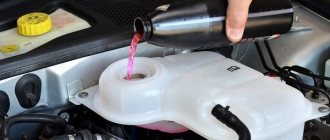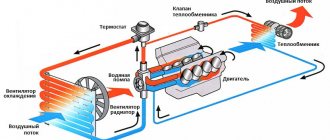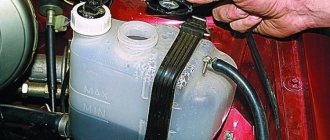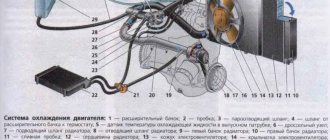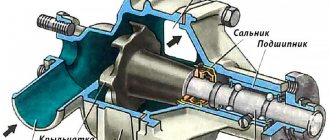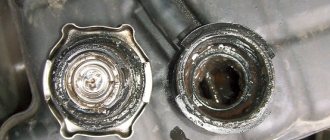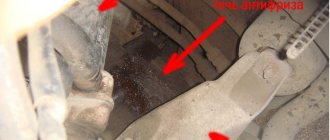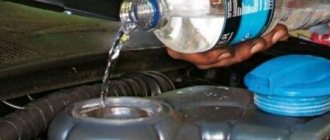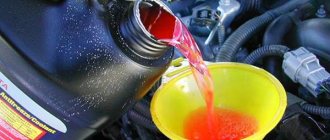Antifreeze goes away - causes and troubleshooting
Sooner or later, owners of used cars have to deal with a malfunction such as a fluid leak from the engine cooling system. In order to detect such problems in time and successfully eliminate them, you need to understand why antifreeze is released through the expansion tank and for what reason its level constantly drops below the minimum. Sometimes this phenomenon indicates a critical malfunction of the power unit, so it is important to deal with the problem as soon as possible.
How does the expansion tank work?
The cooling system of a passenger car contains up to 10 liters of non-freezing liquid - antifreeze or antifreeze. During operation, it heats up in a very wide temperature range - from minus 30 °C (in northern regions) to +100 °C when it reaches operating mode. With such a delta, the liquid expands significantly, adding 5 to 10% in volume.
Hence the need for an additional reservoir that performs the following functions:
- Take away excess antifreeze resulting from heating.
- The cooling system of a car is closed and operates under pressure. When coolant enters the reservoir, the air layer is compressed and the pressure increases. To prevent it from squeezing out the plug, compressed air is released through the valve.
- During cooling, the reverse process occurs - the liquid leaves the reservoir, and the valve releases outside air so that vacuum does not occur in the pipes (an air lock may appear).
The expansion tank itself is a plastic container of any shape with a lid. The latter is equipped with a bypass valve, which releases/releases air or steam when the antifreeze boils.
Signs of cooling system problems
Symptoms of a malfunction include obvious and hidden antifreeze leaks:
- when the liquid is thrown out through the tank cap, streaks are visible around it and on the walls, and a wet spot appears under the car;
- leaks in other places - on pipes and connections, near the pump and the main radiator;
- hidden losses of antifreeze through a leaky cabin heater radiator or as a result of a burnt-out gasket under the cylinder head (cylinder head).
Obvious signs of leaks are easy to detect - by a puddle under the car and drips on hoses and assemblies. Moreover, the position of the wet spot on the asphalt does not always coincide with the location of the actual leak, since antifreeze flows to the ground through the elements protecting the crankcase and engine compartment from dust.
To detect hidden symptoms, a more in-depth diagnosis is needed, including disassembly. If the level in the expansion tank is constantly dropping and fluid has to be added, but the engine compartment is dry, the problem needs to be looked for in the cabin. You will have to remove the facing panels to get to the radiator and check its condition.
Note! When coolant splashes out of the heater radiator, it is absorbed by the floor covering, making the problem difficult to detect. An indirect sign is a sweetish smell of antifreeze in the cabin and a greasy deposit on the windshield in the form of fog, which is difficult to wipe off.
A burned-out cylinder head gasket is indicated by thick white smoke coming from the exhaust tract in any operating mode of the engine. Antifreeze penetrates the cylinders, evaporates when the fuel is burned, and is released through the exhaust pipe as steam. The second sign is the appearance of a suspicious dark-colored slurry in the expansion tank. This is an emulsion formed when antifreeze mixes with engine oil that gets into the cooling system.
Does antifreeze evaporate from the engine cooling system?
Hondavod
Group: .Hondavody. Posts: 1,620 Name:
Evgeniy
City:
Moscow / Noginsk
Car:
Civic 4d, 1.6, automatic transmission, 2004 D16W7
I noticed that in 3 months the level of antifreeze dropped by about 2 centimeters. So: does it evaporate, or should we look for a leak? There are no visible leaks anywhere.
a working cooling system is sealed and nothing can evaporate from it
Look for a leak. It can also press little by little through the cylinder head gasket into the cylinders or into the oil. if in the cylinders, then there will be white “frost” on the spark plugs. if in oil, then the oil is whitish and foams.
But what about the expansion flank? It's not sealed there. water evaporates. if you diluted antifreeze with water.
For 3 months the runoff has not evaporated.
Or maybe the reason is simply simple? )) I once looked at the level in the tank of unheated antifreeze (I simply forgot.), naturally its level was lower than usual and just about two centimeters))))
Yes, in fact, it’s enough to drive the car into the pit and fumble around with the carrier. The main thing is to drive it in dry weather; ideally, the engine should be dry and pleasant to the touch everywhere
The whole joke here is that you need to start the COLD engine and watch. When it’s hot, slight “sweating” just dries right away.
when it’s hot, it usually pushes through, and so you can’t see where it’s running, only through the mud can you find it later
and what is the mileage? the antifreeze, of course, evaporates, if you drove a lot in the summer, then it’s okay, the system is not sealed, there is a special valve in the radiator cap that allows air to pass through, and accordingly, the antifreeze vapors escape, so you shouldn’t even worry about it.
I had this happen on 2 cars when it started leaking from under the pump.
nothing should go anywhere for years! ethylene glycol is a strong poison and the bourgeoisie is very strict with the emissions of all sorts of nasty things into the atmosphere
It’s not for nothing that they have been installing such sophisticated systems for capturing gasoline vapors from the tank for 15-20 years, for example
coolant is running out - look for a fault
Hondavod
Group: .Hondavody. Posts: 1,620 Name:
Evgeniy
City:
Moscow / Noginsk
Car:
Civic 4d, 1.6, automatic transmission, 2004 D16W7
I bought and added antifreeze yesterday. there you only needed 50 grams. but the level in the reservoir on a cold engine was at its lowest. By the way, is it possible to mix blue and green Honda antifreeze?
| In every life you have some trouble. But if you worry you make it double. So don't worry, beeeee happy |
